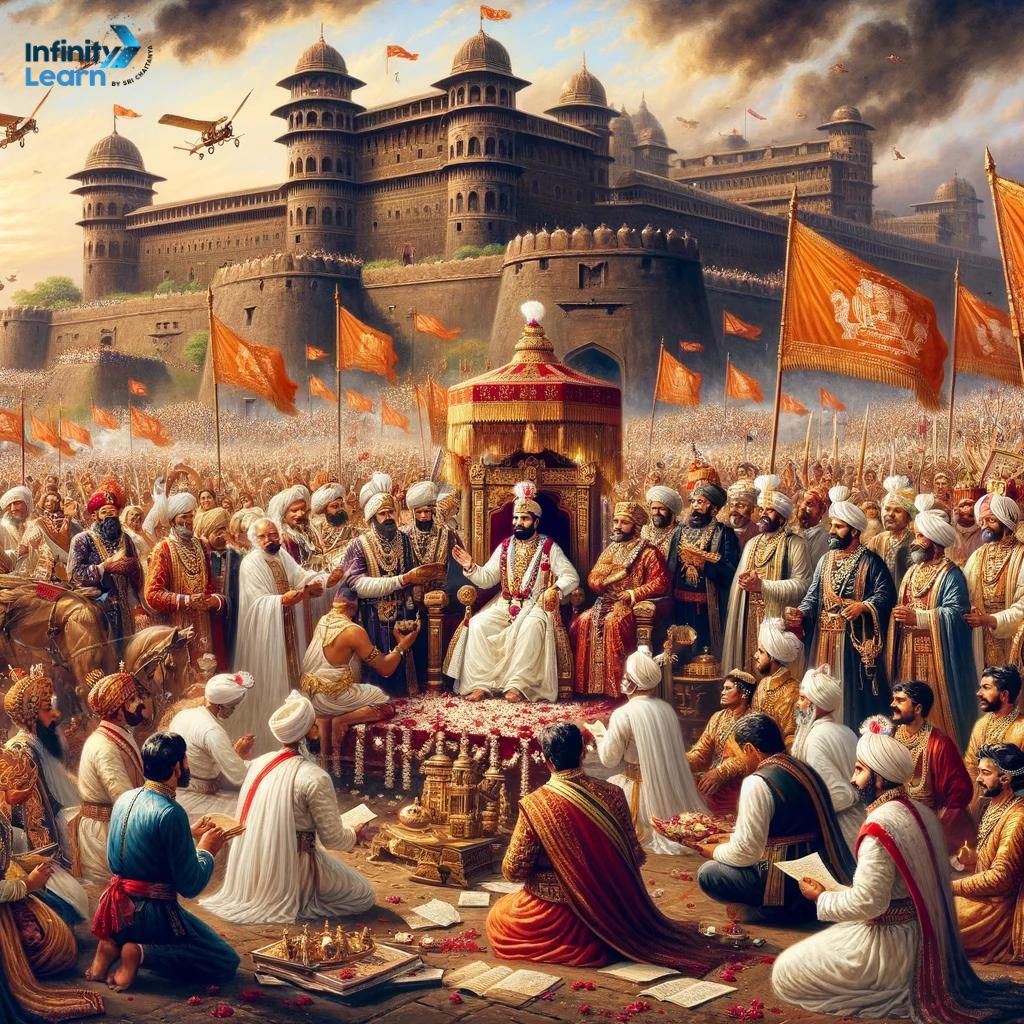Table of Contents
Chhatrapati Shivaji Maharaj
Chhatrapati Shivaji Maharaj (1630-1680) was a significant figure in Indian history, best known for establishing the Maratha Empire. He was born into a family of noble background, with ancestors who were village leaders. Shivaji deeply followed Hinduism and believed he was chosen by the divine to lead Hindus against Muslim domination. He started his military journey at 16 by capturing weaker Bijapur outposts to expand his territory. Despite opposition from Brahmins who viewed him as a Maratha rather than a Kshatriya, he eventually gained recognition as a Kshatriya and was crowned Chhatrapati on June 6, 1674, at Raigad Fort.
Chhatrapati Shivaji Maharaj Rajyabhishek
The Rajyabhishek of Chhatrapati Shivaji Maharaj refers to the day when Shivaji Bhonsle, also known as Chhatrapati Shivaji Maharaj, became the ruler of the Maratha Empire. This special event happened on June 6, 1674, at Raigad Fort, Maharashtra, India. It was a big moment for Shivaji Maharaj, who had been fighting against the Mughal Empire and other powers since the late 1650s.
The ceremony was very grand. Shivaji Maharaj was anointed with holy oils and decorated with valuable jewels. Many Maratha leaders attended and promised to support the new king. The ceremony was led by the Brahmin priest, Gaga Bhatt, who was very close to Shivaji Maharaj.
Shivaji Maharaj’s Rajyabhishek was a symbol of the Maratha Empire becoming strong and independent. The Marathas, mostly Hindus, had been fighting the mostly Muslim Mughal Empire for a long time. Shivaji Maharaj’s coronation marked the start of a new time in Indian history, where local powers began to challenge the Mughal Empire.
The ceremony showed Shivaji Maharaj’s great leadership and his talent for bringing different groups together. The Maratha Empire was made up of many clans and leaders, and Shivaji Maharaj’s ability to unite them and win against the Mughals was amazing.
Shivaji Maharaj’s Rajyabhishek had a big impact on India’s history. It started the Maratha Empire, which became one of the most powerful forces in India. The Marathas kept challenging the Mughal Empire and others for many years, which eventually led to the end of the Mughal Empire and the rise of the British East India Company.
Shivaji Maharaj Rajyabhishek Date
The date of Shivaji Maharaj Rajyabhishek was June 6, 1674, at Raigad Fort.
Shivaji Maharaj Rajyabhishek Photo

Shivaji Maharaj Rajyabhishek Kuthe Jhala
Shivaji Maharaj Rajyabhishek koni kela, means who performed or conducted the Rajyabhishek ceremony of Shivaji Maharaj The Rajyabhishek of Shivaji Maharaj, took place at Raigad Fort. This significant event in Indian history occurred on June 6, 1674. Raigad Fort, situated in the present-day Indian state of Maharashtra, was chosen by Shivaji as the capital of his kingdom and the site for his coronation, symbolizing his sovereignty and the establishment of the Maratha Empire.
Shivaji Maharaj Rajyabhishek Koni Kela
Shivaji Maharaj Rajyabhishek Koni KelaThe coronation of Shivaji Maharaj, known as his Rajyabhishek, was performed by Gaga Bhatt, a noted Brahmin priest from Varanasi. Gaga Bhatt was invited to conduct the ceremony to lend it religious and social legitimacy. He officially crowned Shivaji as the king and declared him the sovereign ruler, bestowing upon him the title of ‘Chhatrapati’, meaning ‘Lord of the Umbrella’. This event took place on June 6, 1674, at the Raigad Fort.
FAQs on Chhatrapati Shivaji Maharaj
Why is Shivaji called Chhatrapati?
Shivaji is called Chhatrapati because it was a royal title he assumed during his coronation, symbolizing his authority as the chief or king of the Maratha Empire. This title reflects his role as a leader who established a sovereign state with a strong emphasis on justice and good governance.
Why is Chhatrapati Shivaji famous?
Chhatrapati Shivaji Maharaj is famous for founding the Maratha Empire in the 17th century. His innovative military tactics, visionary leadership, and the establishment of a progressive administration system made him a revered figure in Indian history. He's celebrated for his resistance against the Mughal Empire and for promoting Marathi culture and language.
How old was Shivaji when he died?
Shivaji Maharaj was 52 years old when he died in 1680. Despite his relatively short life, he left a lasting legacy through the establishment of a strong and independent Maratha Empire, which played a crucial role in the history of India.
How many forts did Shivaji Maharaj won?
Shivaji Maharaj won around 360 forts during his lifetime. These forts were strategically acquired and built to strengthen the Maratha Empire's defense and control over the region. His expertise in fort architecture and guerrilla warfare tactics were key to his success in securing a vast territory.









